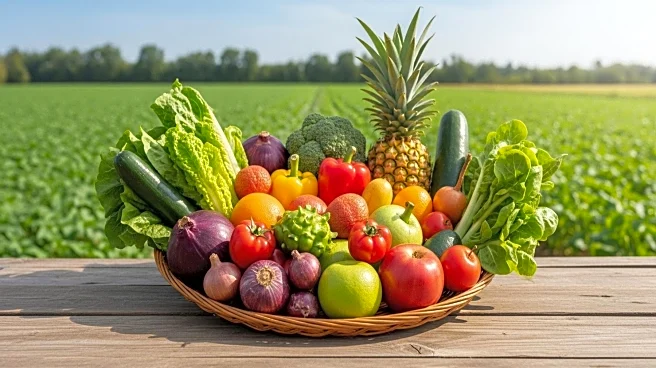What's Happening?
The Sustainable Agriculture Market is experiencing significant growth as global agricultural practices shift towards eco-friendly and climate-resilient methods. The market, which includes techniques such as organic farming, agroforestry, and conservation tillage, is projected to expand from $22.9 billion in 2024 to $69.5 billion by 2034, growing at a CAGR of 11.7%. This growth is driven by increased consumer awareness of food safety and environmental sustainability, alongside government support through subsidies and favorable policies. Key players in the market are investing in precision farming technologies and bio-based inputs, with strategic partnerships and product innovations enhancing their market presence.
Why It's Important?
The expansion of the Sustainable Agriculture Market is crucial for addressing environmental concerns and promoting food security. As consumer demand for organic and chemical-free produce rises, the market's growth supports the transition to more sustainable farming practices. This shift not only benefits the environment by reducing chemical usage but also enhances soil health and biodiversity. The market's growth also reflects broader economic trends, with increased investment in green technologies and sustainable solutions. Companies and governments stand to gain from this transition, as it aligns with global sustainability goals and offers economic opportunities through innovation and market expansion.
What's Next?
The market is expected to continue its growth trajectory, with advancements in precision agriculture and smart farming technologies playing a pivotal role. Governments are likely to increase support for sustainable practices through policy initiatives and subsidies, further accelerating adoption. As the market evolves, stakeholders will focus on overcoming challenges such as high initial investment costs and knowledge gaps among farmers. Strategic planning and collaboration among industry players will be essential to navigate geopolitical tensions and climate variability, ensuring the market's resilience and long-term success.
Beyond the Headlines
The shift towards sustainable agriculture has deeper implications for global food systems and environmental policy. It represents a cultural change in how food is produced and consumed, emphasizing transparency, ethical practices, and social equity. The market's growth could lead to increased research and development in sustainable technologies, fostering innovation and collaboration across sectors. Additionally, the adoption of sustainable practices may influence regulatory frameworks, encouraging more stringent environmental standards and promoting global cooperation in addressing climate change.









